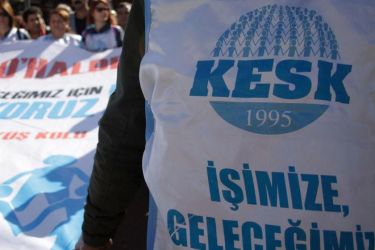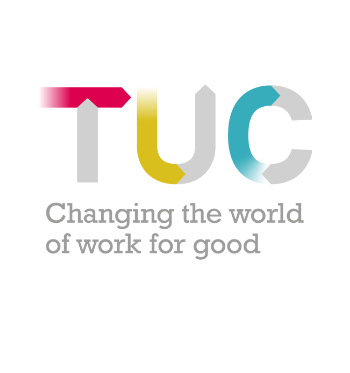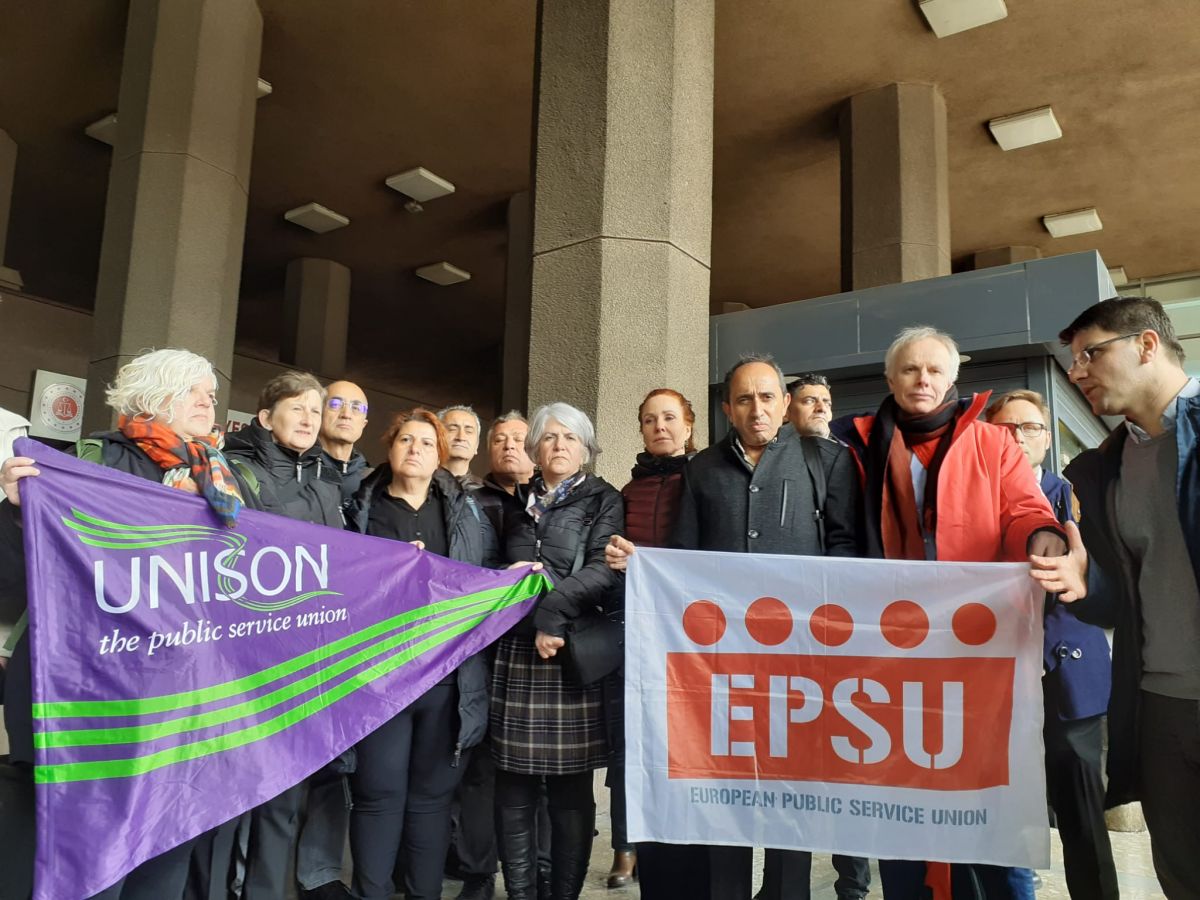
In Turkey trade unionists face politically motivated injustice
In March, an international trade union delegation from the TUC, together with colleagues from UNISON, Unite, and other European trade unions attended the Assize Court in Ankara - more commonly known as the Ankara Heavy Penal Court. We were there to witness the latest hearing in an ongoing trial of a group of trade unionists from the healthcare sector.
What we saw bore raises serious questions about access to due process for trade unionists in Turkey.
The accused
Standing accused were eight leaders of the trade union KESK-SES. SES is the healthcare affiliate of the public employee's trade union federation, KESK.
Five of the defendants are members of the union’s executive committee and are accused of being members of an illegal organisation considered to be terrorist under Turkish law. Turkish law, however, defines terrorism widely - leading to reports of misuse of counter-terrorism legislation to crack down on human rights defenders.
Two of the defendants, a current and former co-president of the union, both nurses and both women, are accused of being leaders of an armed organisation. All are Kurdish citizens of Turkey. All have been in and out of court for several years.
Gönül Erden and Selma Atabey, the two leaders facing the most serious allegations, were both dismissed from their nursing jobs during the public sector purges which followed the attempted military coup in 2016. Both had their applications for investigation and appeal of their dismissals refused.
Then, after being elected to leadership positions in their union, criminal charges were brought against them. Selma has now been in pre-trial detention for eight months and Gönül has been in pre-trial detention for 18 months. The other defendants are on travel bans and must report weekly to local police stations.
The trial we were observing was just one in an apparently endless series of hearings stretching back over years and feared to go on into the future.
The trial
After arriving at the court, our delegation was immediately surrounded by plain clothes police officers. Some filming us, others taking photos of us. Some were just frowning and staring.
Nonetheless, this was an open, public trial, and we were allowed to enter.
The defendants and their council were seated in a pit below an elevated stand. On the stand, positioned several meters above the defence, sat a panel of three judges and the public prosecutor. All four were identically dressed in black and crimson robes, with no visible differentiation between prosecutor and judge.
The hearing began without ceremony, following on from an adjournment of a previous hearing on 26 December 2022. The defendants were accused of visiting a terrorist training camp for 30-40 days during the months of June and July 2015. The accusation is based on the statement of “an anonymous witness” who identified three or four of them by name. We understand from union colleagues in Turkey that the accusations are not consistent from hearing to hearing.
Who was this so-called anonymous witness? The veracity of this witnesses and their evidence was challenged by the defence, but we heard no satisfactory answer.
Lack of evidence
After waiting three months – which for Gönül and Selma meant three unnecessary additional months in pre-trail detention - the defence had received new evidence from the state telecoms company. The evidence was received the day before the trial giving the defence only 24 to review it. However, the report showed that, during the period they were meant to be in so-called terrorist training camps in Iraq, the defendant’s phones had been active in Turkey, exactly where they said they had been.
As Selma argued in a statement in her own defence, during the time she was meant to be “training” in Iraq, she was working as a nurse in Turkey; a job with an annual leave allowance much less than the time she was accused of being away. How can she have disappeared from work without drawing attention, or been in two places at once?
In all the time the defence were presenting their evidence, the judges and prosecutor sat together in silence.
Once the defence had finished refuting the anonymous allegations, the only response from the panel was a motion from the prosecutor calling for their continued imprisonment until a further hearing could be scheduled.
In her courageous closing address, Gönül attacked the political motivations for the trial directly:
“I am here because I am a woman, because I am Kurdish, and because I am a trade unionist. Not for any other reason.”
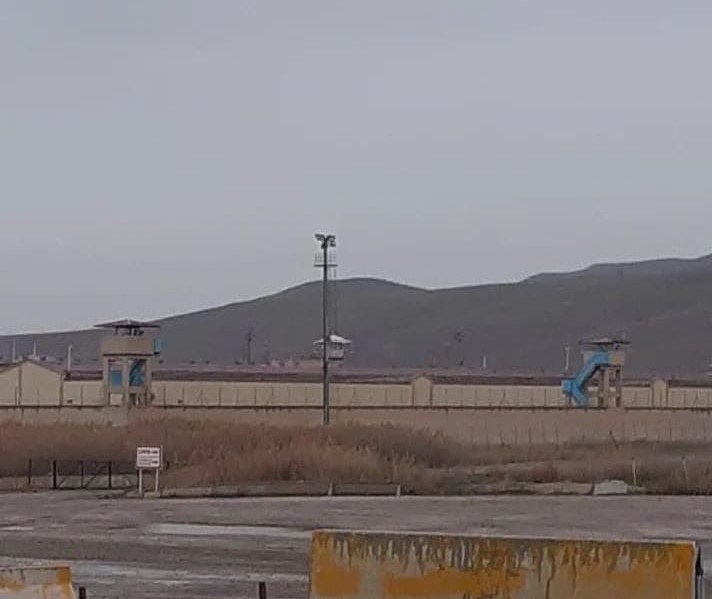
A political matter
During the short adjournment that followed the prosecutor's motion, the international observers - which included Jan Willem Goudriaan, General Secretary of EPSU, and colleagues from the Dutch union FNV and Swedish union ST - joined the friends, family, and supporters of the defendants outside the courtroom. During the adjournment we were also joined by a representative of the British embassy, there at our request.
One observer told us: “this is not a legal matter. If justice was here, it would be the court on trial, not my brother. This is a political matter.”
This cuts to the heart of the issue. The KESK leadership believe that the outcome of this case could even be influenced by the outcome of Turkey’s next General Election, due on May 14th.
Chinks of light
Erdoğan and his AKP government have done all they can to undermine the foundations of democratic life. Opposition politicians and parties as well as trade unions suffer constant harassment from an apparently politicised judiciary. But after over 20 years in power, the AKP’s position is not entirely secure.
The AKP still hold together a large social coalition through political and financial clientelism, not to mention aggressive polarisation driven by their outspoken Islamist conservatism.
But trade unionists and opposition politicians told us that years of haywire neoliberal economics, corruption, and repression have begun to fracture the AKP coalition and to unify opposition - not only among persecuted minorities like the Kurds, but among women, secularists, and democrats.
The gigantic loss of life which resulted from the recent Earthquakes can be traced back to government measures which allowed construction companies, packed with AKP cronies, to avoid following building safety regulations. The problem is now compounded by corruption and incompetency in the distribution of aid. These are factors that could further destabilise the AKP’s hegemonic position this May.
In the end, the result was a little better than hoped. Gönül was released from pre-trial detention into house arrest, while the position of the other defendants remains unchanged, with Selma remaining in prison. The next hearing date is set for June 5th – following the elections.
Solidarity matters
Despite the severity of the situation, travelling to the prison that evening with Gönül’s family and her comrades from KESK-SES provided a moment of hope. Gönül has spent 18 months in a high security prison block specifically reserved for PKK members, detained by a state doesn’t distinguish between self-admitted members of the PKK and the many imprisoned journalists, trade unionists, and human rights defenders who deny membership.
Nonetheless, it was a joy to share her release even if it was into relative, not complete, liberty.
There is no doubt our presence, and the continuing presence of trade union observation missions, is making a difference. It is vital that the state’s political victims are not allowed to be forgotten and that the global trade union movement continues to call for their freedom.
It is vital that our trade union sisters, brothers, and comrades are not left alone under the bootheel of a deplorable regime.
Their courage was an inspiration to me and, as trade unionists, we must do what we can to support them now and for as long as they need us.
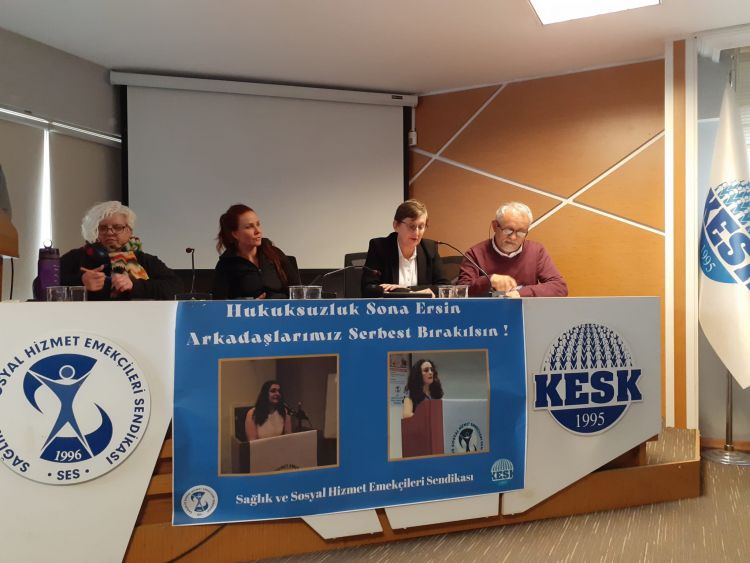
Stay Updated
Want to hear about our latest news and blogs?
Sign up now to get it straight to your inbox


